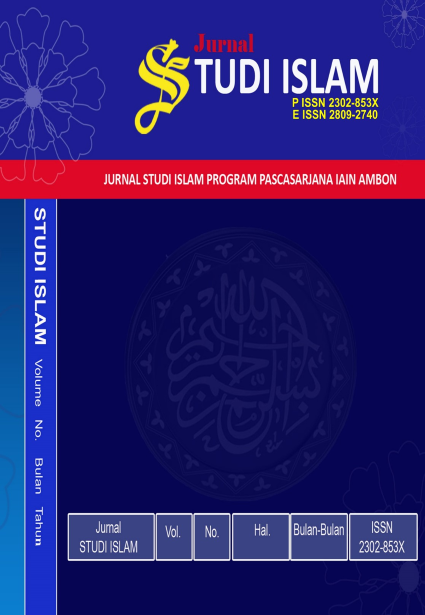INFLUENCE OF CHARACTER EDUCATION ON POLITICAL LEADERSHIP IN ISLAM
DOI:
https://doi.org/10.33477/jsi.v12i2.5565Keywords:
Character Education, Political Leadership, Islam.Abstract
This study highlights the significant impact of character education in the Islamic context on political leadership development. This study bases its analysis on literature studies carried out in an integrative and comprehensive manner by examining and combining various relevant literature sources. The results show that character education in Islam is based on strong moral and ethical principles, including honesty, integrity, justice, and social responsibility. Political leadership in Islam puts forward the principles of justice, accountability, and concern for the general welfare. Character education is crucial in forming leaders with high morality and ethics. In addition, the influence of character education on political leadership is critical in shaping responsible, just, inclusive, and moral leaders who tend to lead sustainable leadership, maintain peace, and promote justice. In this regard, the influence of character education on political leadership in Islam is critical to creating leaders who can maintain peace, resolve conflicts, and participate in moral international diplomacy. Character education also makes leaders who can communicate honestly, maintain morality and ethics, and lead with integrity.
References
Ahearn, Kathleen K, Gerald R Ferris, Wayne A Hochwarter, Ceasar Douglas, and Anthony P Ammeter. “Leader Political Skill and Team Performance.” Journal of Management 30, no. 3 (2004): 309–27. https://doi.org/10.1016/j.jm.2003.01.004.
Alim, Akhmad, Askar Patahuddin, Syamsuar Hamka, and M Amirullah. “The Concept of Personality and Its Relevance to Character Education in The Light of The Islamic Worldview.” Edukasi Islami: Jurnal Pendidikan Islam 11, no. 03 (2022): 903–18. https://doi.org/10.30868/ei.v11i03.2978.
Chu, William C K, Ming-sum Tsui, and Miu-chung Yan. “Social Work as a Moral and Political Practice.” International Social Work 52, no. 3 (2009): 287–98. https://doi.org/10.1177/0020872808102064.
Curren, Randall. “Why Character Education?” Impact 2017, no. 24 (2017): 1–44. https://doi.org/10.1111/2048-416X.2017.12004.x.
Cwalina, Wojciech, and Andrzej Falkowski. “Morality and Competence in Shaping the Images of Political Leaders.” Journal of Political Marketing 15, no. 2–3 (2016): 220–39. https://doi.org/10.1080/15377857.2016.1151121.
Fleeson, William, R Michael Furr, Eranda Jayawickreme, Peter Meindl, and Erik G Helzer. “Character: The Prospects for a Personality‐based Perspective on Morality.” Social and Personality Psychology Compass 8, no. 4 (2014): 178–91. https://doi.org/10.1111/spc3.12094.
Hoodfar, Homa, and Samad Assadpour. “The Politics of Population Policy in the Islamic Republic of Iran.” Studies in Family Planning 31, no. 1 (2000): 19–34. https://doi.org/10.1111/j.1728-4465.2000.00019.x.
Ikhwan, Afiful. “Leadership In Islamic Education: Study Of Thematic Al-Qur’an And Al-Hadist.” ULUL ALBAB Jurnal Studi Islam 17, no. 1 (2016): 31–46. https://doi.org/10.18860/ua.v17i1.3253.
Ismail, Ismail. “Character Education Based on Religious Values: An Islamic Perspective.” Ta’dib: Jurnal Pendidikan Islam 21, no. 1 (2016): 41–58. https://doi.org/10.19109/td.v21i1.744.
Karimullah, Suud Sarim. “Religion and State in the Islamic Political Paradigm in Indonesia Perspective of Prof. Kamsi.” Analisis: Jurnal Studi Keislaman 22, no. 1 (2022): 53–74. https://doi.org/https://doi.org/10.24042/ajsk.v22i1.12648.
Karimullah, Suud Sarim, Moh Amin, and Ummu Diana Munawwarah. “Strengthening Spiritual Education Based on the Qur’ān in Building Character in the Digital Age.” Devotion Journal of Community Service 3, no. 14 (2022): 2785–94. https://doi.org/10.36418/dev.v3i14.316.
Karimullah, Suud Sarim, Mu’adil Faizin, and Aufa Islami. “Internalization of Islamic Moderation Values in Building a Civilization of Love and Tolerance.” Al-Insyiroh: Jurnal Studi Keislaman 9, no. 1 (2023): 94–125. https://doi.org/https://doi.org/10.35309/alinsyiroh.v9i1.6345.
Karimullah, Suud Sarim, Tita Pertama Wati, Ainun Najib, and Wahyudi Wahyudi. “Iksan Kamil Sahri’s Perspective on Dualism of the Education System in Indonesia.” Devotion Journal of Community Service 4, no. 3 (2023): 737–48. https://doi.org/10.36418/devotion.v4i3.422.
Koehrsen, Jens. “Muslims and Climate Change: How Islam, Muslim Organizations, and Religious Leaders Influence Climate Change Perceptions and Mitigation Activities.” Wiley Interdisciplinary Reviews: Climate Change 12, no. 3 (2021): 702. https://doi.org/10.1002/wcc.702.
Krumrei-Mancuso, Elizabeth J, and Wade C Rowatt. “Humility in Novice Leaders: Links to Servant Leadership and Followers’ Satisfaction with Leadership.” The Journal of Positive Psychology 18, no. 1 (2023): 154–66. https://doi.org/10.1080/17439760.2021.1952647.
Lapidus, Ira M. “The Golden Age: The Political Concepts of Islam.” The Annals of the American Academy of Political and Social Science 524, no. 1 (1992): 13–25. https://doi.org/10.1177/0002716292524001002.
Mansbridge, Jane. “A ‘Selection Model’ of Political Representation.” Journal of Political Philosophy 17, no. 4 (2009): 369–98. https://doi.org/10.1111/j.1467-9760.2009.00337.x.
Mawardi, Abu al-Hasan al. Al-Ahkam Al-Sultaniyya. Beirut: Dar al-Kutub al-’Ilmiyya, 1985.
Mecham, R Quinn. “From the Ashes of Virtue, a Promise of Light: The Transformation of Political Islam in Turkey.” Third World Quarterly 25, no. 2 (2004): 339–58. https://doi.org/10.1080/0143659042000174842.
Moghadam, Valentine M, and Fatemeh Haghighatjoo. “Women and Political Leadership in an Authoritarian Context: A Case Study of the Sixth Parliament in the Islamic Republic of Iran.” Politics & Gender 12, no. 1 (2016): 168–97. https://doi.org/10.1017/S1743923X15000598.
Moore, James. “The Sunni and Shia Schism: Religion, Islamic Politics, and Why Americans Need to Know the Differences.” The Social Studies 106, no. 5 (2015): 226–35. https://doi.org/10.1080/00377996.2015.1059794.
Mujahid, Imam. “Islamic Orthodoxy-Based Character Education: Creating Moderate Muslim in a Modern Pesantren in Indonesia.” Indonesian Journal of Islam and Muslim Societies 11, no. 2 (2021): 185–212. https://doi.org/10.18326/ijims.v11i2. 185-212.
Mumford, Michael D, Stephen J Zaccaro, Francis D Harding, T Owen Jacobs, and Edwin A Fleishman. “Leadership Skills for a Changing World: Solving Complex Social Problems.” The Leadership Quarterly 11, no. 1 (2000): 11–35. https://doi.org/10.1016/S1048-9843(99)00041-7.
Osler, Audrey. “Patriotism, Multiculturalism and Belonging: Political Discourse and the Teaching of History.” Educational Review 61, no. 1 (2009): 85–100. https://doi.org/10.1080/00131910802684813.
Rahim, Adibah Binti Abdul. “Understanding Islamic Ethics and Its Significance on the Character Building.” International Journal of Social Science and Humanity 3, no. 6 (2013): 508–13. https://doi.org/10.7763/IJSSH.2013.V3.293.
Shah, Saeeda. “Educational Leadership: An Islamic Perspective.” British Educational Research Journal 32, no. 3 (2006): 363–85. https://doi.org/10.1080/01411920600635403.
Witro, Doli. “Ulama and Umara in Government of Indonesia: A Review Relations of Religion and State.” Madania: Jurnal Kajian Keislaman 24, no. 2 (2020): 135–44. https://doi.org/10.29300/madania.v24i2.3778.
Yan, Xuetong. “Political Leadership and Power Redistribution.” The Chinese Journal of International Politics 9, no. 1 (2016): 1–26. https://doi.org/10.1093/cjip/pow002.
Zaim, Halil, Ahmet Demir, and Taylan Budur. “Ethical Leadership, Effectiveness and Team Performance: An Islamic Perspective.” Middle East Journal of Management 8, no. 1 (2021): 42–66. https://doi.org/10.1504/MEJM.2021.111991.














